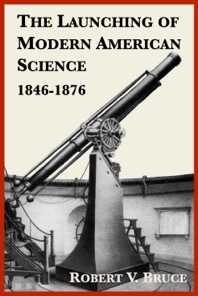 $9.99 on Kindle, Nook, Apple Books, Kobo, Google Play
$9.99 on Kindle, Nook, Apple Books, Kobo, Google Play(cover by Susan Erony)
The Launching of Modern American Science, 1846-1876 by Robert V. Bruce (200,000 words, 16 illustrations)
Winner of the 1988 Pulitzer Prize in History
“For readers born since the 1930’s, who have grown up assuming the United States leads the world in science, The Launching of Modern American Science 1846-1876 will come as something of a shock. It shows that little over a century ago the American scientific community was small, mediocre and unpromising... Mr. Bruce has performed an invaluable service in retrieving from numerous archives the letters and diaries of mid-19th-century American scientists, in which both the well-known ones and the obscure describe their assimilation of the scientific ethos — their discovery of the fascination of lab work, their contempt for charlatanism, their dreams for the future of American science... he has done extensive archival research as well as detailed analyses of scientists and technologists listed in the Dictionary of American Biography... he has provided a wealth of information on the people and institutions of mid-19th-century American science.” — Rosalind Williams, The New York Times
“[A] superb study of the dawn of science and technology in the United States... [Bruce’s] premier focus in this and earlier books is mid- to late- 19th-century America, and one feels in the presence of a master who creates a reality of time and place that is breathtaking... Bruce meticulously documents the text with names, numbers, dates and places, with vignettes and personality sketches, noting that it was the American style of science to develop technique, to observe, describe and catalogue, rather than theorize... A scholarly gem.” — Kirkus
“If I had to recommend only one book on the critical period of development of nineteenth-century science in America, it would be this one. Bruce’s book, a social history of science and the scientific community, is about launching the American ship of science on its course to professionalization, modernity, and international competitiveness. His goal is to tell how American scientists and engineers established new national patterns and organizations in science and technology, still prevalent today... For a most critical period in the history of science in America, Bruce has produced a thorough and well written historical demography of scientists, their institutions (societies, journals, jobs, colleges, schools, laboratories, museums, lectures, agencies, expeditions, surveys), and public relations.” — Donald deB. Beaver, Journal of the History of Medicine and Allied Sciences
“Drawing upon an enormous number of primary sources and scores of secondary works, Bruce has produced a truly important book. His incisive analyses, his exemplary style of writing, and his graceful touches of humor make it a fascinating one... [a] splendid book [which] fills a gap in our knowledge of the history of science in the United States and deserves the attention of everyone who desires to know when and how modern science fledged in America.” — Lester D. Stephens, Science
“[A] book not just to be looked through, but looked at... Bruce displays a remarkable grasp of its sources — primary and secondary, in manuscript and print, statistical studies of his own and others — and it will be the well-informed historian indeed who fails to make discoveries here... Bruce writes a proprietary prose that... is both eloquent and playful. A magisterial study of the development of science under the peculiar constraints of democratic culture, The Launching belongs with the half dozen or so classics that have appeared since the history of American science came out of drydock four decades ago.” — William Stanton, Isis
“[A]n exceptionally fine and eminently readable piece of historical scholarship... The book is a major contribution the scientific community in nineteenth-century America.” — Keith R. Benson, Bulletin of the History of Medicine
“This will be the definitive account for a long time indeed.” — John C. Burnham, American Scientist
“[I]t is difficult to say too much good about The Launching of Modern American Science, which [is] a major interpretation of the period... a book so altogether excellent... [it] gives a view of that period that is both convincing and illuminating. As a very welcome extra, it is so well written that it is a joy to read.” — George H. Daniels, History of Education Quarterly
“[A]n ample, thoughtful, scholarly, and well-written survey.” — A. Hunter Dupree, The New England Quarterly
“[A] rich and well-documented account. This is a readable book that should find a broad audience.” — Elizabeth Barnaby Keeney, The British Journal for the History of Science
“This long-awaited and important book admirably details how American science was transformed in the mid-nineteenth century from an enterprise of disparate local amateurs to an organized cadre of nationally — and nationalistically — ambitious professionals. Bruce manages to capture the texture of scientific life in its various local, regional, and disciplinary settings; its connections with economic and technological development; and its public posturings on issues ranging from religion to race. The book is enlivened throughout by attention to the leading scientific personalities of the day. In all, The Launching of Modern American Science is a wonderful work of scholarship, a well-disciplined and thoroughly readable synthesis of prior studies and material drawn from a vast body of manuscript sources, one against which all future studies of science in mid-nineteenth-century America will be measured.” — Daniel J. Kevles, California Institute of Technology
“Those familiar with Professor Bruce’s previous distinguished work will not be disappointed in their expectations. This well-balanced, carefully researched and eminently readable account of a formative period in American science — and intellectual life generally — is bound to become an important contribution to a rapidly growing area of scholarly concern. Anyone concerned with the shaping of American thought and the development of our cultural institutions will find this book of extraordinary interest.” — Charles Rosenberg, University of Pennsylvania



